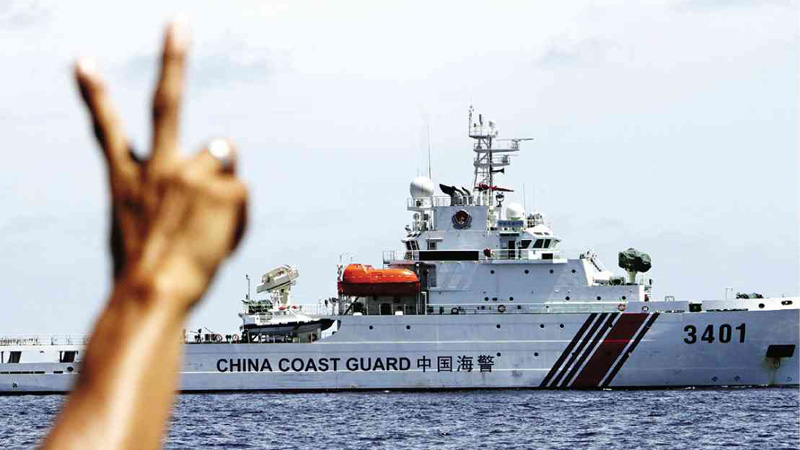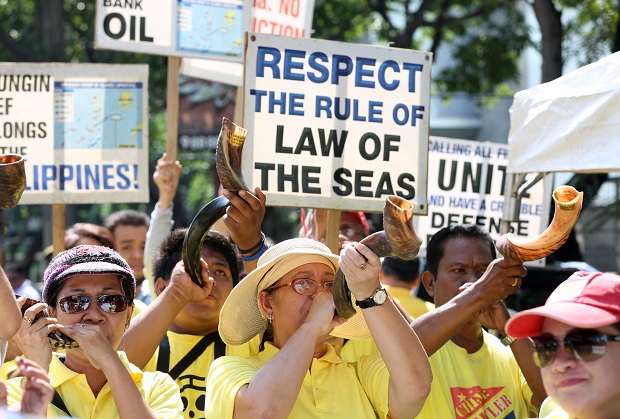China naval chief says minor incident could spark war in South China Sea
China's naval commander told his U.S. counterpart that a minor incident could spark war in the South China Sea if the United States did not stop its "provocative acts" in the disputed waterway, the Chinese navy said on Friday.
Admiral Wu Shengli made the comments to U.S. chief of naval operations Admiral John Richardson during a video teleconference on Thursday, according to a Chinese naval statement.
The two officers held talks after a U.S. warship sailed within 12 nautical miles of one of Beijing's man-made islands in the contested Spratly archipelago on Tuesday.
China has rebuked Washington over the patrol, the most significant U.S. challenge yet to territorial limits China effectively claims around its seven artificial islands in one of the world's busiest sea lanes.
"If the United States continues with these kinds of dangerous, provocative acts, there could well be a seriously pressing situation between frontline forces from both sides on the sea and in the air, or even a minor incident that sparks war," the statement paraphrased Wu as saying.
"(I) hope the U.S. side cherishes the good situation between the Chinese and U.S. navies that has not come easily and avoids these kinds of incidents from happening again," Wu said.
Speaking earlier, a U.S. official said the naval chiefs agreed to maintain dialogue and follow protocols to avoid clashes.
Scheduled port visits by U.S. and Chinese ships and planned visits to China by senior U.S. Navy officers remained on track, the official said.
"None of that is in jeopardy. Nothing has been cancelled," said the official.
UNPLANNED ENCOUNTERS
Both officers agreed on the need to stick to protocols established under the Code for Unplanned Encounters at Sea (CUES).
"They agreed that it's very important that both sides continue to use the protocols under the CUES agreement when they're operating close to keep the chances for misunderstanding and any kind of provocation from occurring," the U.S. official said.
Indeed, Wu said he believed the Chinese and U.S. navies had plenty of scope for cooperation and should both "play a positive role in maintaining peace and stability in the South China Sea".
A U.S. Navy spokesman stressed Washington's position that U.S. freedom of navigation operations were meant to "protect the rights, freedoms, and lawful uses of the sea and airspace guaranteed to all nations under international law".
Chinese warships followed the USS Lassen, a guided-missile destroyer, as it moved through the Spratlys on Tuesday. The U.S. Navy is operating in a maritime domain bristling with Chinese ships.
While the U.S. Navy is expected to keep its technological edge in Asia for decades, China's potential trump card is sheer weight of numbers, with dozens of naval and coastguard vessels routinely deployed in the South China Sea, security experts say.
China has overlapping claims with Vietnam, the Philippines, Malaysia, Taiwan and Brunei in the South China Sea, through which $5 trillion in ship-borne trade passes every year.
Next week, Chinese President Xi Jinping will visit Vietnam and Singapore, while Chinese Defence Minister Chang Wanquan will attend a meeting of Southeast Asian defence ministers in Malaysia that U.S. Defense Secretary Ash Carter is also due to attend.
COURT SETBACK
Separately, China suffered a legal setback on Thursday when an arbitration court in the Netherlands ruled it had jurisdiction to hear some territorial claims the Philippines has filed against Beijing over the South China Sea.
The court said additional hearings would be held to decide the merits of the Philippines' arguments. China has not participated in the proceedings and does not recognise the court's authority in the case.
Manila filed the case in 2013 to seek a ruling on its right to exploit the South China Sea waters in its 200-nautical mile exclusive economic zone (EEZ) as allowed under the United Nations Convention on the Law of the Sea (UNCLOS).
China, facing international legal scrutiny for the first time over its assertiveness in the South China Sea, would neither participate in nor accept the case at the arbitration court, Vice Foreign Minister Liu Zhenmin said on Friday.
Liu told reporters the case would not affect China's sovereign claims in the seas.
The Philippine government welcomed the court decision.
Solicitor General Florin Hilbay, Manila chief's lawyer in the case, said the ruling represented a "significant step forward in the Philippines' quest for a peaceful, impartial resolution of the disputes between the parties and the clarification of their rights under UNCLOS".
(Reporting by Ben Blanchard, Michael Martina and Wini Zhou in Beijing, Andrea Shalal, David Brunnstrom and Yegenah Torbati in Washington, Anthony Deutsch in Amsterdam and Manuel Mogato in Manila; Writing by Dean Yates; Editing by Paul Tait)







